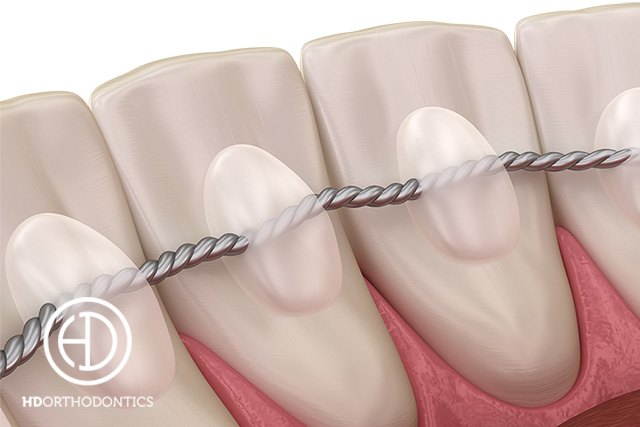Is a Permanent Retainer Right for Me?


Long Beach, CA – The day your braces come off is a cause for celebration. We know our patients work incredibly hard during their orthodontic treatment and can’t wait to show off their new smiles. But just because your braces are off that doesn’t mean your orthodontic treatment is finished.
In order to keep that smile as straight as the day we remove your braces, it’s important to wear a retainer. A retainer’s job is exactly what its name implies – it retains the teeth in their new positions. This is important because the ligaments and tissues of your gums are a bit elastic, and they will have a tendency to try to pull the teeth back to their previous locations once your treatment is over. But if you wear a retainer, it holds the teeth in their new locations as the ligaments, tissues and bone stabilize and get used to their new positions (why retainer wear is important?)
Most patients use removable retainers, but for some patients, permanent retainers may be recommended. But what exactly is a permanent retainer?
A permanent retainer consists of a metal wire that is attached to the teeth using a bonding material. They are recommended for patients who have a high potential for relapse or who may not be able to adhere to the proper retainer wear. They are most commonly used on the lower anterior teeth, because this area has the highest risk for relapse. When placed on the back of the upper teeth, patients often bite on them, resulting in the wire debonding and becoming loose. For this reason, we typically only recommend upper permanent retainers in limited cases.
Permanent retainers are also called lingual wires or fixed retainers. The wire is bonded to the back surface of the teeth and will hold the teeth in their locations. If taken care of well, fixed retainers can last 20-30 years!
What are the pros to a permanent retainer?
- You don’t have to worry about taking it on and off – it’s always in place, so it’s always working.
- Because it’s always in place you don’t have to worry about losing it.
- It’s bonded behind your teeth so no one will even know you have one.
- It won’t affect the way you speak.
- It’s difficult to damage.
- It keeps your teeth in place with minimal effort from you.
What are the cons of permanent retainers?
- Brushing and flossing takes longer because you have to pay close attention to cleaning around the retainer.
- It can be uncomfortable or annoying to have it in place all the time.
- You may need to avoid certain foods to ensure you don’t damage the retainer (eating anything too hard or tough can damage it)
- The wire can break or come unbonded, which requires repair, and if not noticed can lead to tooth movement
Permanent retainers can be a great alternative to removable retainers for some patients. To determine what the best option is for you after your braces are removed, it’s important to discuss the pros and cons of each option with your orthodontic team. Your orthodontist will know which option is the most ideal for you and your situation.

